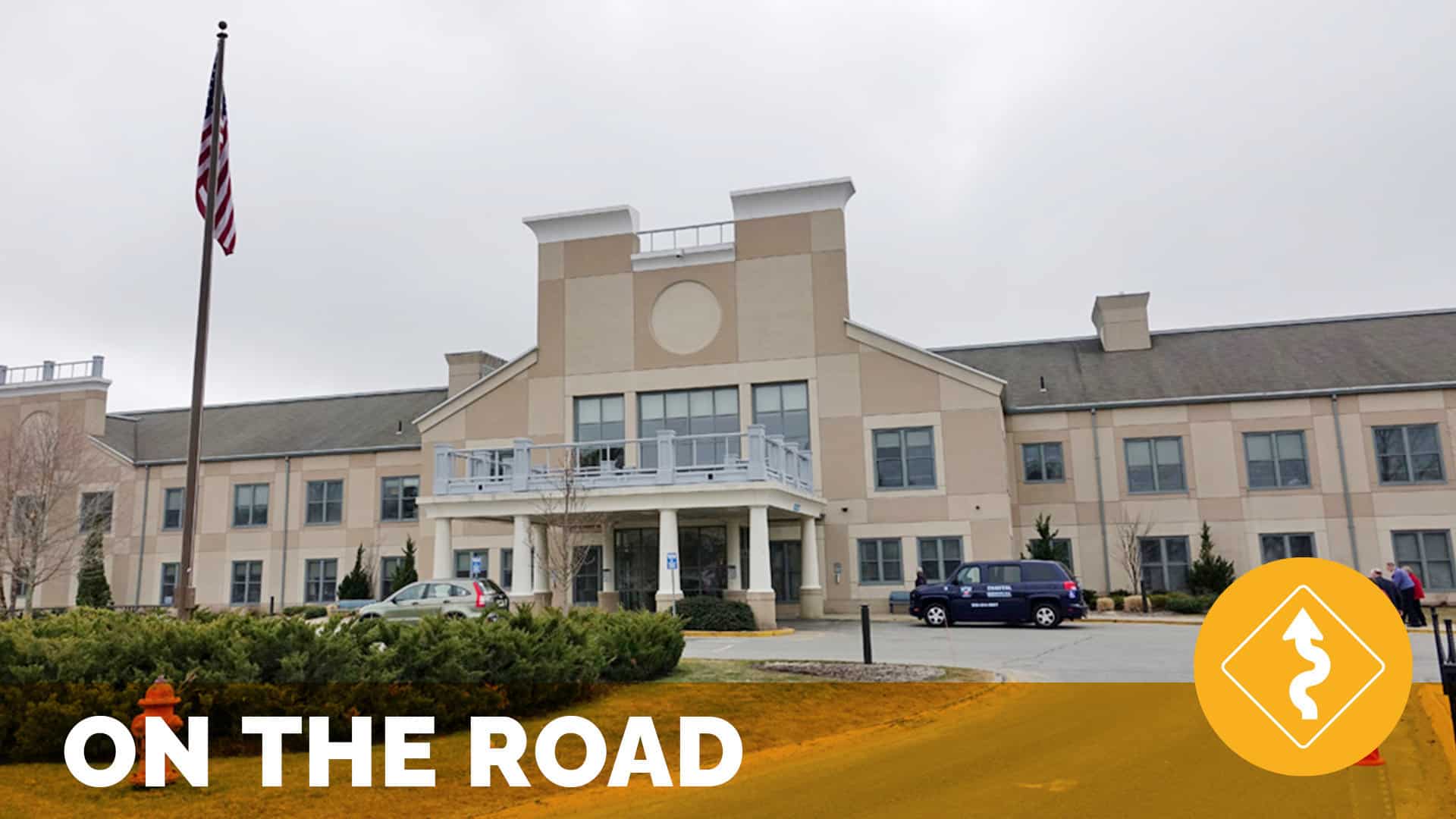Bridging the Gap between Acute Care and Home

On the Road with Spaulding Cape Cod – June 2013
by Stacy Palmer
Our June On the Road took me to the quaint and historic towns along Cape Cod, Massachusetts at the start of their summer season. Nestled within the scenic landscapes, near the beautiful East Coast beaches, lies Spaulding Cape Cod of the Spaulding Rehabilitation Network (SRN), part of Massachusetts’s Partners HealthCare. The Spaulding network is made up of two intensive rehabilitation hospitals, two long term care hospitals, two skilled nursing facilities and 23 outpatient centers, including two pediatric centers . The Cape Cod facilities are strategically located to offer convenient access to the unique population within the 65-mile stretch of the Cape.
My host for the visit was Linda Melillo, member of The Beryl Institute and Director of Patient Experience for the Spaulding Rehabilitation Network and Director of Quality & Compliance for Spaulding Cape Cod. Melillo attended her first Patient Experience Conference in Dallas this year and embraced the sharing of knowledge and ideas. “There were great, practical take-aways and it was energizing to be with others whose work focuses on the patient experience. Patient experience is my passion,” she said. And that definitely came through during our visit.
Linda MelilloMelillo joined Spaulding about two years ago. She’s based at Spaulding Rehabilitation Hospital Cape Cod, a 60-bed inpatient facility also offering outpatient services, where she’s responsible for quality & compliance, patient safety and corporate compliance, in addition to overseeing patient experience for the entire Spaulding network.
In her patient experience role, Melillo is supported by a new interdisciplinary committee that refers to its efforts as SEEP – Spaulding Extraordinary Experience Project. Their goal is to ensure awareness, education and common direction. They recently instituted goal setting and action planning with all facilities focused on four key areas measured by their National Press Ganey inpatient rehabilitation satisfaction surveys: overall satisfaction, likelihood to recommend, accuracy of information received about the program and training given to the patient and family about care at home after discharge. While all facilities are focused on driving improvements in these areas, each has developed its own action plan to get there. Only two quarters into the process, improvement had already occurred with overall satisfaction rocketing from the 61st percentile to the 90th percentile. Now three quarters in, overall satisfaction is at the 92nd percentile and the likelihood to recommend is at the 99th percentile.
Melillo acknowledges that there are some challenges in addressing patient experience in a small hospital, “It requires everyone to be on board and leaders must make it a priority.”
All Hands on Deck to Make it a Great Experience
It was clear throughout my visit that this is something Spaulding is extremely successful at. The teams at each facility we visited showed great compassion and respect for patients and families and a sincere desire to personalize care.
Perhaps one of the greatest examples of this is in the admissions process at Spaulding Cape Cod. Great care is taken to make patients feel comfortable from the moment they arrive. Staff coordinates in advance with the referring hospital so that the room is prepared to accommodate all of the patient’s needs and the feeling that ‘we’ve been waiting for you’ is conveyed. They have a program in place for frontline staff to collaborate with referring hospitals so they can talk through the transition and understand the patient’s experience throughout their care journey. “We want to gain the patient’s trust from the first day,” said Kim Patota, PT, Inpatient Physical Therapy Supervisor. “Based on the reception they get, they feel they’re in a good place and that fosters a feeling of safety and security.”
Daina Juhansoo, Ann Comiskey, Kim PatotaThat focus on positive experience continues throughout the patient’s stay. Three days after admission, each patient is given a “service recovery survey” – a chance for the staff to check-in and be sure things are going smoothly. “By the third day patients typically feel a bit more relaxed and are more likely to bring up concerns,” said Ann Comiskey, OTR/L, Inpatient Occupational Therapy Supervisor. This check-in has surfaced many addressable opportunities for the staff. For example, in one situation a roommate’s TV was too loud and was distracting for the other patient. Staff provided headphones that helped both patients feel comfortable during their stays.
A common theme from an inpatient perspective at Spaulding Cape Cod was the desire to be a ‘bridge between the acute hospital and home.’ All care is focused on helping the patients prepare to be on their own in the home setting.
Talk Discharge from Day One
When Spaulding heard feedback from its Patient and Family Advisory Council (PFAC) that patients often felt unprepared to go home, they made a point to start addressing discharge from day one. This sets expectations for both patients and their family members. They understand what a typical stay looks like in terms of length and treatment, what needs to happen before they can go home, and what other post-stay possibilities might be.
Medication TeachingMedication Teaching
Another concern raised by PFAC was that patients didn’t always understand how to take their medications after discharge. Working with staff from pharmacy, physician services, case management and others, SCC nurses Laurie Shippey, CRRN and Julieanne Gardiner, CRRN analyzed how they were doing medication teaching and made several changes to the process. They created an electronic teaching tool for patients, reinforced the purpose of medications at each med pass, and reviewed information at several points during the admission and again on the day of discharge. The result was a dramatic improvement in patients’ satisfaction with medication teaching and a presentation at the National Association of Rehabilitation Nurses Annual Conference last year.
Incorporating familiar activities into therapeutic exercise makes therapy more relevant to patients – and it helps prepare them for the transition to home. Years ago, recognizing many Cape Cod residents enjoy gardening, a Spaulding staff member had the idea to create an outdoor garden. Funded by donations, the garden is a resource therapists regularly use to help patients develop functional skills.
Near the garden is a putting green where patients who hope to return to golf can come out and hit golf balls – a wonderful therapy tool and also a great way to connect patients with a regular pastime.
Functional Living Apartment
Spaulding Cape Cod has a suite furnished like a traditional home, including a full kitchen, bathroom and bedroom. The space is used to give patients and/or family members a chance to test their readiness to be on their own by practicing everything from meal preparation and bathing to medicine administration (Note – Spaulding staff still administer medications but patients ‘notify’ staff when it’s time). “It’s a great opportunity for a spouse to see what their loved one is capable of and to help them understand what assistance they will need to provide when the patient arrives home,” said Kim Patota.
Peer Visitations
It can be frustrating for a patient to hear from well-meaning family and friends that they ‘understand’ what the patient is feeling or experiencing when the patient realizes that just isn’t the case. That’s where Spaulding’s population of former patients play a critical role. Patients like Jim, a stroke survivor, who periodically pops in to offer hope, visiting with new stroke survivors and families and offering a level of reassurance that daily life can get easier with time. Jim also leads the hospital’s Stroke Peer Visitation Program and its Stroke Survivors Support Group. Former patients also lead some of Spaulding’s other support groups that are structured around specific diagnoses and age groups to help patients better connect and relate to each other.
Spaulding’s therapeutic recreation specialist, Kathy Murphy, CTRS, plays a key role in preparing a patient for the return home. She helps families reconnect with their loved ones and understand how to interact with them after a life-changing circumstance. The Spaulding care team was proud to cite the example of a patient who loved playing cards before his stroke. However, after the stroke he had difficulty holding a deck of cards. When Murphy heard about the situation, she located adaptive equipment to help the patient enjoy his favorite pastime again. Not only did his family come in to play cards with him, other patients joined in. At one point staff found a large group of patients together playing cards and having a great time – so much so that nurses had to come in and interrupt for medication administering.
Realizing the importance of helping patients foster connections with other patients and their families, Murphy actually adjusted her hours so she could be onsite more on evenings and weekends when family members typically visit.
All members of the Spaulding staff are constantly looking for a critical ‘nugget’ of information to help them connect with a patient – not only to build relationships and trust, but also to aid in therapy. Murphy encouraged a group of patients to organize their own Super Bowl party for family and friends when she saw their excitement about the upcoming event. “It’s about empowering patients to do what they would normally do at home to help them feel like themselves again,” said Daina Juhansoo, DPT, Inpatient Director.
Meeting Tom
During my visit, I had the pleasure of spending time with Tom, a 49-year old diagnosed with multiple sclerosis in 2002. He was in the middle of his third stay at Spaulding and had an amazing attitude and sense of appreciation for the hospital staff. Smiling and acknowledging that although he was not admitted for a social event, he enjoyed the kindness and encouragement of the staff.
Tom cited a moving example of a situation that happened during his therapy session on the previous day. Tom is working hard at getting his life back to as normal as possible – including walking. During the session, his therapist decided to use a full-length mirror to help Tom visualize how his balance was affected so that he could compensate for the change. While it was a good care approach, the shock of seeing his reflection and the degree to which this progressive disease had impacted his strength was extremely upsetting. Tom broke down as he realized that the person in the mirror seemed so much weaker than how he felt on the inside. It was a very difficult session for Tom – I could still see the pain in his face as he recalled it during our discussion. But he quickly turned our conversation to express his appreciation for how his care team acknowledged and handled his reaction; they showed great patience and compassion.
Tom has such an inspirational outlook. The advice he gives to new patients coming in is to have the right attitude, be ready to work and make the best of the situation. In fact, he makes a point while he’s in the hospital to seek other patients who have MS and offer support and insight. He also has an enormous respect for the physical therapists and the progress they’ve helped him achieve. “This is what keeps me going,” he said.
Environments for Recovery
In addition to providing emotional and physical support, Spaulding works hard to create positive environments for patients and families. In building its newest outpatient center in Orleans, staff at the old facility actually met with architects to review their wish lists – much of which were incorporated into the design.
Lobby at OrleansI toured the facility with Orleans’ Site Manager Deborah Downey, PTA, and Spaulding’s Director of Outpatient Rehabilitation, Sharon Gale, PT, MHA. Both were excited to point out features such as a larger, more welcoming waiting room, more private rooms and exam rooms, a staff lounge and a conference room that allows them to open their space for community meetings. The new space also allows them to schedule longer appointments, something requested by patients and families so they have more time with therapists and physicians.
The Spaulding Eileen M. Ward Outpatient Center for Children in Sandwich is designed to help children feel comfortable and at home. The center is bright, inviting, cheerful and colorful, and it provides staff with ample resources to meet the needs of each child through creative and challenging activities. Even the waiting room is specially designed to entertain siblings who often hang out while their brothers or sisters are receiving care. When touring the facility with Site Manager Tara Souve, PT, I was especially moved by ‘Logan’s Story’ depicted in a piece of art on the wall. It shows Logan, a former patient, in drawings throughout her care journey, including an emotional hug with her therapist.
Food and Environmental Services – Outsourced Partners Integrated into the Team
Spaulding’s main Cape Cod facility enlists Sodexo to manage its food and environmental services, but to patients and staff they are simply part of the overall care team. I had the chance to meet with Kerry Rodrigues, Sodexo GM & ES and Kristina Conaway, Dietician, who were excited to share ways their team helps impact patient experience. “Patients are at the heart of everything we do,” said Rodrigues.
From personalized menu selections delivered within two meals of admission to special holiday trays and birthday cakes, they find unique ways to make patients smile. They also present each patient with a homemade cranberry orange loaf at discharge.
Sodexo’s experienced team (Rodrigues and Conaway have each been at Cape Cod for 13 years) is well-integrated into the staff and community. They work with local vendors to purchase locally-grown crops when possible, have adopted many procedures to be more green in their work, and help plan fun events likes staff BBQ’s, ice cream socials and pizza parties.
Celebrating Successes and People
In an effort to keep staff focused and excited about patient satisfaction success, Melillo partnered with Sodexo to implement ice cream socials to celebrate when scores are in the 90th percentile. A poster with the achievement is created and displayed and leadership is onsite to scoop ice cream. Everyone is included – with festivities during all shifts at all sites.
The ice cream socials are just one example of how Spaulding celebrates staff. Spaulding Network CEO Maureen Banks hosts monthly birthday luncheons featuring such things as shrimp and prime rib served in an elaborate setting with tablecloths and china.
The organization also sponsors many levels of recognition and awards for staff. The highest honor is the network-wide Partners in Excellence (PIE) award presented to individuals and team members who truly go above and beyond in their daily roles. I had a chance to sit with Dyan Wyman, Spaulding Cape Cod’s HR Manager. She and Melillo were excited to share the PIE pins attached to their badges – a great reflection of the pride felt by recipients.
There’s also a monthly ‘STAR’ Employee of the month award. Nominations come in from peers and final selections are made by senior leadership. A new feature was added to the program recently – surprising recipients in their work areas with cake and balloons. The staff member is also acknowledged with a photo in the employee ‘Spotlight’ newsletter and receives a star to add to his or her badge.
Spaulding acknowledges great work in other ways as well – with everything from an ‘On the Spot’ rewards program where peers can recognize each other for daily successes to the annual Spirit Awards sponsored by family members of former patients.
Medical JeopardyCreating a fun and encouraging environment is a high priority at Spaulding, and team members are encouraged to find ways to contribute. Sherri Tupper, M.D., Spaulding Cape Cod’s Director of Inpatient Medical Services, started an intense clinical education program for staff that wraps up with an annual game of ‘Medical Jeopardy’ where interdisciplinary teams compete to test what they’ve learned. “We’ve had tremendous engagement with the Medical Jeopardy program,” said Wyman. “It’s a fun way to encourage staff to broaden their medical knowledge, and it becomes highly competitive.”
The time and attention Spaulding contributes to acknowledging staff and creating a positive work environment was apparent throughout my visit – and was displayed wholeheartedly in the pride staff showed in their work and organization.
Community Involvement
Melillo describes working at Spaulding as ‘the best of both worlds.’ The facilities have access to resources of the Partners and Spaulding networks but also enjoy the ability to be flexible and customize programs to reflect the characteristics and personality of the distinct communities they serve. “Even though we’re part of a larger system, what serves each community best is what drives change in this organization,” said Melillo.
I was impressed by Spaulding’s long list of community-focused programs. From a Pediatric Lecture Series to a Parkinson’s Wellness Program, they’ve found multiple ways to serve patients and families on an ongoing basis.
Cyclist at Martha’s Vineyard‘CapeAble Adventures’, partnered with Spaulding’s adaptive sports program, offers a broad range of land- and water-based adaptive sporting activities, all delivered with careful attention to the value of sports and fitness to the rehabilitation process. Whether it is wheelchair tennis, hand cycling, adaptive rowing, or windsurfing, those living with disabilities after illness or injury can rebuild their strength and sense of independence while they increase body awareness, build self-confidence, learn new life skills, and even make new friends.
Children and adults can participate in Spaulding Adaptive Sports programs under the supervision of adaptive sports professionals as well as Spaulding therapists, providing the perfect environment to try a new sport or get back to ones they have always loved. Trained staff will help identify activities and adaptive equipment most appropriate for each participant, based on his or her capabilities. Recently, in partnership with Warfighter Sports, Disabled Sports USA, a number of Paralympic athletes plus other organizations and community supporters, Spaulding Cape Cod hosted the Sport and Spirit adventure weekend for combat-wounded veterans of the Iraq and Afghanistan wars.
Spaulding also offers a ‘Fit to Be Kids’ program to encourage healthy lifestyles and weight management for children at risk for health problems due to being overweight.
The list goes on. From providing meeting places for support groups, internships for local students with cognitive disabilities, stroke awareness clinics, preventative screenings and more, advocacy and community support are a huge focus at Spaulding.
In Conclusion
I ended my visit meeting with Stephanie Nadolny, Spaulding Cape Cod’s Vice President of Hospital Operations. It was clear that her leadership by example has had a huge impact on Spaulding’s culture. With a priority of rounding every day, Nadolny says. “I would love to meet every single patient.” She wants her staff to continually strive to understand what it’s like to be a patient or a family member and to remember the importance of staying connected and compassionate.
I had a wonderful day getting to know the team at Spaulding Cape Cod and learning about their patient experience journey. Their story is inspiring on so many levels – the focus on culture and staff engagement, the deep roots in the community and the attention to detail in making their facilities places where patients and families will be comfortable – but the highlight that stands out most is their focus on listening to the patient. Yes, they have PFACs and satisfaction surveys, but beyond those valuable tools, I was inspired by the candid recognition of staff that they may not always know what’s best for the patient. As Ann Comiskey articulated, “What it really comes down to is taking time to slow down and think ‘what’s important for THIS patient?’ Listen to their suggestions. You may find new solutions that work or opportunities to negotiate and help them feel included in their care plan.”
That personalization and sincere interest in getting to the core of patient fears and needs was apparent in all three facilities that I visited, and I applaud Spaulding Cape Cod for creating a culture where staff feel empowered to make that connection.
Related content
-
 Environment & Hospitality
Environment & HospitalityManaging Patient Belongings: A Shared Responsibility
By Cathy Mixon Patient Relations Liaison M Health Fairview On behalf of the Lost Belongings Workgroup of the Patient Advocacy Community This PX blog is the second in a series that builds on the content from “Where Are My Things? Best Practices for Safeguarding Patient Belongings in Hospitals,” a handbook for those managing patient belongings
Learn more -
 Culture & Leadership | Staff & Provider Engagement
Culture & Leadership | Staff & Provider EngagementMoving from “Good to Great”: Enhancing the Human Experience in Outpatient Care
Join us for an insightful webinar on Hartford HealthCare’s “Good to Great” (G2G) initiative, a transformative approach designed to improve patient experience across the organization. Launched in 2023, G2G uses a data-driven methodology to analyze patient experience and colleague engagement, identifying units as low-, middle-, or high-performing. Focusing on middle-performing teams, this initiative leverages strong
Learn more -
 Environment & Hospitality
Environment & HospitalityDesigning a Safe and Comprehensive Gluten-Free Menu to Improve the Human Experience
Discover how patient feedback at UNC Hospitals led to a comprehensive overhaul of gluten-free food safety protocols. This initiative targeted cross-contamination by establishing dedicated preparation areas for gluten-free items and enhancing staff training on allergy management. Beyond improving safety and expanding menu options, this project fostered stronger cross-functional collaboration and demonstrated a deeper organizational commitment
Learn more
